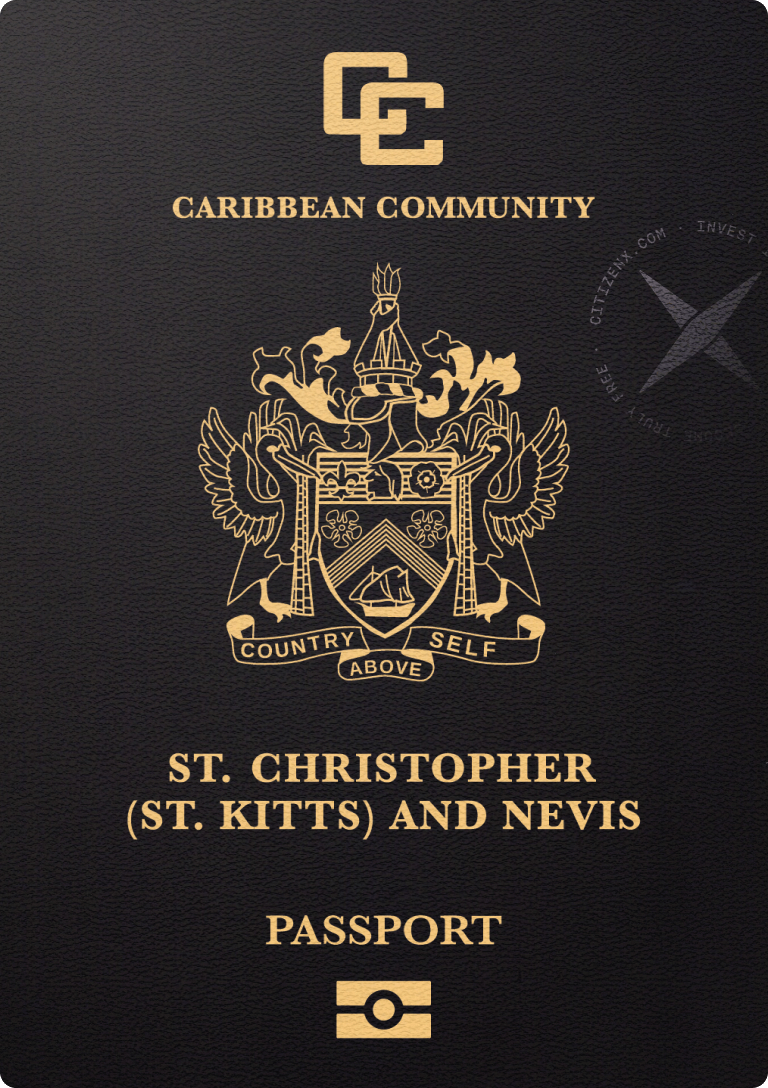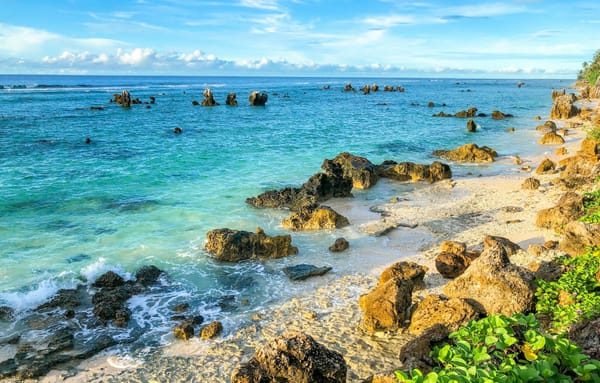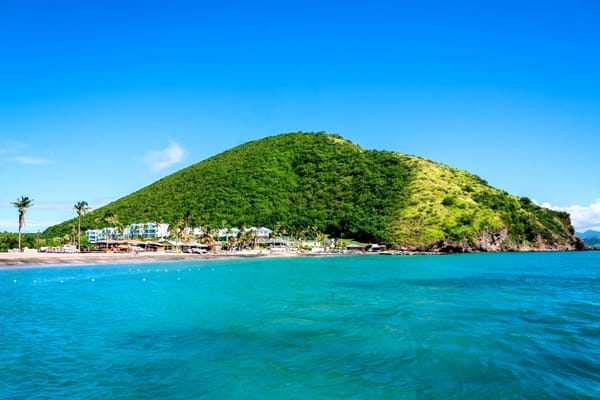The St. Kitts & Nevis Citizenship by Investment (CBI) program stands as the world's oldest and most prestigious economic citizenship program, having operated continuously since 1984.
For high-net-worth individuals seeking global mobility, tax optimization, and generational wealth protection, understanding Form C1—the cornerstone application document—is essential for successful program participation.
The evolution of Caribbean economic citizenship
St. Kitts & Nevis pioneered the concept of citizenship by investment four decades ago, creating a model that would reshape global mobility for affluent families worldwide. The program has weathered economic storms, adapted to international regulatory changes, and consistently maintained its position as the Caribbean's gold standard for economic citizenship. In 2025, following strategic adjustments to investment thresholds and processing requirements, the program continues to offer unparalleled value for qualifying applicants.
The Citizenship by Investment Unit (CIU), now operating as an independent statutory body from its headquarters at Lot No. C-37B Lime Kiln Commercial & Institutional Development in Basseterre, oversees all aspects of the program. This institutional independence, established through the Citizenship by Investment Unit Act 2024, represents a significant enhancement in program governance and transparency.
For prospective applicants, Form C1—the Application for Registration as a Citizen of St. Kitts & Nevis—serves as the gateway to Caribbean citizenship. This comprehensive document, available exclusively through government-authorized agents, initiates a rigorous vetting process that has earned the program its reputation for integrity and reliability.

Form C1 requirements reflect program sophistication
The current Form C1 requirements as of June 2025 demonstrate the program's evolution toward enhanced due diligence and transparency. Every applicant aged 16 and above must now participate in mandatory interviews, conducted either virtually or in-person by independent professional firms commissioned by the CIU. This requirement, introduced as part of the program's continuous improvement initiatives, ensures direct engagement with applicants and strengthens the vetting process.
The application package centers on four essential forms. Form C1 itself requires detailed personal information including educational background, employment history, family details, and comprehensive financial disclosure. Each applicant must complete their form personally, with signatures required from all applicants aged 16 and above. Parents sign on behalf of children under 16, ensuring proper authorization for minor dependents.
Form C2, the Photograph and Signature Certificate, must be completed before a notary public, attorney-at-law, or two senior bank officers. This document provides official verification of the applicant's identity through certified photographs and signatures. Form C3 encompasses medical certification requirements, including mandatory HIV testing for applicants aged 12 and above, with test results valid for only three months from the date of examination. Form C4 serves as the investment confirmation document, varying based on the chosen investment route.
The supporting documentation requirements reflect international best practices in identity verification and financial transparency. Birth certificates must be originals, accompanied by certified English translations where necessary. Passport copies require certification of photo pages, citizenship confirmation, and issue/expiry dates. Police clearance certificates must cover the country of citizenship plus any country where the applicant resided for one year or more during the past decade.
Financial documentation demands particular attention to detail. Applicants must provide 12 months of bank statements dated within six months of submission, demonstrating consistent financial capacity and clean transaction history. Bank reference letters from internationally recognized institutions confirm the applicant's financial standing and banking relationships. Source of funds documentation represents perhaps the most critical element, requiring clear demonstration of legitimate wealth accumulation through business ownership, employment, investments, inheritance, or other lawful means.
Investment pathways balance accessibility with value
The 2025 investment structure reflects strategic adjustments designed to maintain program competitiveness while ensuring sustainable contribution levels. The Sustainable Island State Contribution (SISC) option, reduced from $350,000 to $250,000 for a family of up to four members, represents the most straightforward path to citizenship. This non-refundable contribution supports seven national development priorities: local food production, economic diversification, green energy transition, sustainable industries, creative sector development, post-pandemic recovery, and social protection enhancement.
Real estate investment options provide recoverable investment opportunities for those preferring tangible assets. The minimum investment threshold for approved development projects decreased to $325,000 in October 2024, down from the previous $400,000 requirement. These investments typically involve shares in luxury resorts, hotels, or residential developments approved by the CIU. Investors must maintain ownership for seven years before resale eligibility, though the property may generate rental income during this period.
Private real estate purchases offer another avenue, with minimum thresholds of $325,000 for condominium units and $600,000 for single-family homes. These properties cannot be resold to another CBI applicant during the seven-year holding period unless significant additional investment receives Cabinet approval. The stricter oversight of real estate projects implemented in 2023 resulted in only nine developments maintaining approved status, down from 95 previously, ensuring higher quality standards and investor protection.
The Public Benefit Option (PBO) requires a $250,000 minimum contribution toward infrastructure and development projects that maximize local employment and technology transfer. Recent PBO projects include MSR Hotels, MSR Media, Prime Creative Arts Center, and Royal St Kitts Beach Resort, demonstrating the program's commitment to national development alongside citizenship provision.
Eligibility extends beyond financial capacity
While investment capability remains fundamental, the program's eligibility criteria encompass comprehensive character and background requirements. Main applicants must be 18 years or older, demonstrating good character with no criminal background that would compromise the program's integrity. The ability to make the required investment must come from legitimate sources, verified through extensive documentation and due diligence procedures.
The program's family-friendly approach allows inclusion of various dependents. Spouses qualify automatically, while children up to age 30 may be included if financially dependent on the main applicant. For children aged 18-25, full-time education enrollment provides the basis for dependency, while those 18 and above with physical or mental challenges qualify regardless of education status. Parents aged 55 and above—reduced from the previous 65-year threshold—may be included if financially dependent on the main applicant. Recent additions also permit inclusion of unmarried siblings under 30 years of age.
Certain nationalities face automatic exclusion from the program. Citizens of Iran, Afghanistan, North Korea, and Cuba cannot participate, reflecting international sanctions and diplomatic considerations. The program also excludes individuals previously denied visas to countries offering visa-free access to St. Kitts citizens, those involved in activities that could bring disrepute to the nation, and anyone subject to criminal investigation or conviction.
Due diligence defines program integrity
The St. Kitts & Nevis CBI program's reputation rests on its comprehensive six-layer due diligence system, recognized globally as the industry gold standard. This multi-faceted approach begins with authorized agent screening, where licensed representatives conduct initial anti-money laundering and counter-terrorism financing checks while assessing preliminary eligibility.
The CIU's internal review team verifies document authenticity and compliance with program requirements, ensuring all submissions meet established standards. International due diligence providers based in Europe, the UK, and USA conduct independent investigations using open-source intelligence, media searches, and on-ground verification where necessary. These firms operate independently of the government, providing objective assessment of each applicant's background and associations.
Document verification extends beyond simple authentication to include validation of educational credentials, employment history confirmation, and financial record examination. Cross-referencing with international law enforcement databases ensures applicants don't appear on sanctions lists, Interpol notices, or criminal databases. The final CIU assessment synthesizes all gathered information, conducting comprehensive risk evaluation before making recommendations to the Minister.
The establishment of the Continuing International Due Diligence (CIDD) Unit in July 2024, headquartered in Europe, adds post-citizenship monitoring capabilities. This ongoing oversight ensures approved citizens maintain standards consistent with program requirements, protecting the integrity of St. Kitts & Nevis citizenship and passport privileges globally.
Timeline expectations require realistic planning
Processing timelines for St. Kitts & Nevis citizenship applications reflect the thoroughness of the vetting process. The standard timeline spans three to nine months from initial submission to passport issuance, though individual cases may vary based on complexity and documentation completeness. The due diligence phase alone typically requires four months, representing the most time-intensive component of the process.
Initial document review by the CIU takes one to two months, during which officials verify submission completeness and request any additional information. Following approval-in-principle, applicants have up to three months to complete their investment, whether through SISC contribution, real estate purchase, or public benefit donation. Certificate and passport issuance requires an additional two to four weeks after investment confirmation.
The mandatory interview requirement adds a scheduling component to the timeline. Virtual interviews offer flexibility for international applicants, while some may choose in-person meetings at designated locations. These interviews, conducted by independent professional firms, assess the applicant's genuine intention and connection to their application, serving as a crucial element in the enhanced due diligence process.
Physical presence in St. Kitts is required only for certificate collection, which must be done in person either on the island or at an approved embassy or consulate. This requirement ensures proper identity verification at the final stage of the citizenship process. Some applicants combine this trip with property viewing or familiarization visits, transforming an administrative requirement into an introduction to their new citizenship.
Common mistakes jeopardize application success
Understanding frequent application errors helps prospective citizens avoid costly delays or rejections. Documentation mistakes represent the most common category of problems, with incomplete police certificates topping the list. Applicants must obtain certificates from every country of residence throughout their adult life, not just their current location. Missing even one jurisdiction creates grounds for application delay or rejection.
Source of funds documentation frequently proves problematic when applicants provide insufficient detail about wealth origins. Generic bank statements without supporting evidence of income sources, business ownership documents, or inheritance papers fail to meet CIU standards. The unit requires clear, documentable paths showing how applicants accumulated their investment funds through legitimate means.
False or inconsistent information leads to immediate and permanent rejection. Discrepancies between application forms and supporting documents, omission of relevant information such as previous visa denials, or attempts to conceal criminal records result in application failure and potential blacklisting. The comprehensive due diligence process invariably uncovers such inconsistencies, making full disclosure essential from the outset.
Using unauthorized agents or participating in illegal discount schemes guarantees application rejection. The CIU maintains a strict list of authorized agents, and applications submitted through non-approved channels face automatic denial. Similarly, any attempt to pay below published investment thresholds, regardless of promises made by developers or intermediaries, results in rejection and potential legal consequences.
Health-related rejections remain rare but possible, particularly for communicable diseases that pose public health risks. The mandatory HIV testing requirement, while controversial in some circles, reflects the government's commitment to protecting public health while maintaining reasonable accommodation for qualified applicants.
Fee structures demand comprehensive budgeting
Beyond the headline investment amounts, successful applications require budgeting for various government fees, professional services, and ancillary costs. Due diligence fees of $10,000 for the main applicant and $7,500 for each dependent aged 16 and above must be paid upon application submission. These non-refundable fees cover the cost of comprehensive background investigations.
Government processing fees vary by investment option but typically include $25,000 for the main applicant, $15,000 for a spouse, and $10,000-15,000 for each dependent. Application processing fees of $250 per person, certificate fees of $50 each, and passport fees of $350 per person add to the total cost. Real estate investors face additional expenses including land ownership licenses (10% of property value), stamp duties, legal fees, and ongoing property taxes.
Professional fees for authorized agents and attorneys typically range from $6,000 to $15,000 per application, depending on family size and complexity. Document preparation, translation, and notarization costs can add $1,000-2,000, while banking and wire transfer fees typically total $500-1,000. International courier services for secure document transmission add several hundred dollars to the total.
For a single applicant choosing the SISC option, total costs including all fees typically reach $275,000-300,000. Family applications naturally increase these amounts, though the SISC contribution remains fixed at $250,000 for up to four family members, providing economies of scale for family groups.
Benefits extend across generations
St. Kitts & Nevis citizenship delivers comprehensive benefits that justify the investment for qualifying high-net-worth individuals. Visa-free access to 155-157 countries includes the entire Schengen Area, United Kingdom, Singapore, Hong Kong, and numerous other business and leisure destinations. This global mobility proves particularly valuable for business owners, investors, and families seeking educational opportunities worldwide.
The favorable tax regime offers significant advantages for international entrepreneurs and investors. St. Kitts & Nevis imposes no income tax, capital gains tax, inheritance tax, or wealth tax on non-resident citizens. Even residents benefit from competitive tax rates, with no personal income tax and limited corporate taxation. This tax efficiency, combined with robust banking secrecy laws, creates an attractive environment for wealth preservation and growth.
Commonwealth membership provides additional benefits often overlooked by applicants focused solely on visa-free travel. Access to Commonwealth scholarship programs, preferential treatment in member nations, and strong diplomatic protection through British embassies and consulates where St. Kitts lacks representation enhance the citizenship's practical value.
The program's multi-generational nature ensures benefits pass to future descendants, creating lasting value beyond the initial investment. Children born to St. Kitts citizens automatically acquire citizenship, regardless of birthplace, ensuring family legacy protection. The ability to add family members post-citizenship, though subject to additional fees and vetting, provides flexibility for evolving family structures. Learn more about passing down St. Kitts citizenship to future generations.
Recent updates strengthen program positioning
The 2024-2025 period witnessed significant program enhancements designed to maintain competitiveness while strengthening integrity measures. The reduction in investment thresholds from $350,000 to $250,000 for the SISC option responded to market feedback following 2023 price increases that significantly reduced application volumes. This adjustment, combined with real estate threshold reductions, positions St. Kitts competitively among Caribbean CBI programs.
Mandatory interviews for all applicants aged 16 and above represent the most significant process change. These interviews, conducted by independent firms, add a personal element to the due diligence process while enabling direct assessment of applicants' intentions and backgrounds. Virtual interview options accommodate international applicants while maintaining rigorous standards.
The reduction in dependent parent age requirements from 65 to 55 years acknowledges changing family dynamics and earlier retirement trends globally. This change allows younger parents to benefit from their children's success while maintaining the requirement for financial dependency. Similarly, provisions for including siblings under 30 years recognize extended family structures common in many cultures.
Infrastructure improvements include digital application tracking systems, enabling authorized agents to monitor application progress in real-time. This transparency reduces uncertainty and improves communication throughout the process. The CIU's transition to statutory corporation status provides operational independence and enhanced accountability, strengthening program governance for long-term sustainability.
Success strategies maximize approval probability
Successful navigation of the St. Kitts & Nevis CBI program requires strategic planning and meticulous execution. Selecting an experienced authorized agent represents the crucial first decision. Top-tier agents maintain near-perfect approval rates through careful client screening, comprehensive document preparation, and deep understanding of CIU requirements and preferences.
Pre-application financial planning ensures smooth source of funds documentation. Consolidating investment funds into clearly traceable accounts, obtaining professional letters from accountants or financial advisors, and preparing comprehensive business ownership documentation several months before application prevents delays during processing.
Document preparation requires attention to authentication requirements. All foreign documents need appropriate apostille or consular legalization, while translations must come from certified translators. Obtaining police certificates early prevents expiration during the application process, as most certificates remain valid for only six months.
Maintaining consistency across all application elements prevents red flags during due diligence. Employment histories, residential addresses, and travel patterns should align across forms, supporting documents, and interview responses. Any discrepancies require clear explanation with supporting documentation to avoid suspicion or delays.
Post-approval planning includes investment completion strategies and certificate collection logistics. Real estate investors should conduct thorough due diligence on properties, potentially visiting St. Kitts before finalizing purchases. SISC contributors benefit from understanding the fund's development priorities and impact on national development.
The St. Kitts advantage in Caribbean context
While St. Kitts & Nevis pioneered Caribbean CBI programs, five nations now offer economic citizenship options. Each program features unique characteristics, investment levels, and processing approaches. St. Kitts consistently ranks highest in independent program assessments, reflecting its longevity, reputation, and operational excellence.
The program's 40-year history provides unmatched stability and international recognition. While newer programs may offer lower investment thresholds or faster processing times, St. Kitts citizenship carries prestige and acceptance built over decades. Financial institutions, immigration authorities, and government agencies worldwide recognize St. Kitts passports as legitimate and properly vetted documents.
Due diligence standards set St. Kitts apart from regional competitors. The six-layer vetting process, enhanced by mandatory interviews and ongoing monitoring through the CIDD Unit, exceeds requirements in other Caribbean programs. This thoroughness protects the program's integrity and ensures continued visa-free access agreements with partner nations.
The absence of physical residency requirements provides flexibility uncommon in global citizenship programs. Unlike many nations requiring significant physical presence before or after naturalization, St. Kitts imposes no such obligations. This feature particularly benefits international business owners and investors who cannot commit to extended residency periods. Read our comprehensive guide to St. Kitts & Nevis citizenship by investment for detailed program comparisons.
Future outlook remains bright
The St. Kitts & Nevis Citizenship by Investment program enters its fifth decade from a position of strength. Recent reforms addressing pricing, governance, and due diligence position the program for continued success despite increasing global competition. The government's commitment to maintaining high standards while adapting to market demands suggests sustainable program operation for decades ahead.
Economic diversification efforts funded partially through CBI revenues reduce the nation's dependence on any single industry. Tourism, financial services, and renewable energy investments create employment and growth opportunities for citizens while maintaining the stability international investors expect. The program's contribution to national development extends beyond direct revenue to include real estate development, job creation, and international investment attraction.
For qualified high-net-worth individuals, St. Kitts & Nevis citizenship through Form C1 represents more than a travel document or tax planning tool. It provides security, opportunity, and legacy protection in an uncertain world. The combination of visa-free travel to 157 destinations, favorable tax treatment, Commonwealth benefits, and generational citizenship transmission creates lasting value justifying the investment.
The program's evolution continues with digital transformation initiatives, enhanced family inclusion provisions, and strengthened governance structures. These improvements ensure St. Kitts & Nevis remains the Caribbean's premier citizenship by investment destination for discerning global citizens seeking the best in economic citizenship programs.
Mastering Form C1 ensures citizenship success
Form C1 stands as the gateway to St. Kitts & Nevis citizenship, demanding careful attention to detail and comprehensive preparation. Success requires understanding not just the form's requirements but the broader program context, investment options, and strategic considerations that maximize approval probability.
The 2025 program structure balances accessibility with integrity, offering multiple investment pathways while maintaining rigorous vetting standards. Whether choosing the straightforward SISC contribution, exploring real estate opportunities, or supporting public benefit projects, applicants must approach Form C1 with professionalism and complete disclosure.
Working with experienced authorized agents, preparing comprehensive documentation, and maintaining consistency throughout the application process position applicants for success. The mandatory interview requirement adds a personal dimension to the process while ensuring genuine applicants receive fair consideration.
For those who successfully navigate the process, St. Kitts & Nevis citizenship delivers exceptional value through global mobility, tax efficiency, and generational security. The program's four-decade history, continuous improvements, and commitment to excellence ensure its position as the Caribbean's leading citizenship by investment option for years to come.
High-net-worth individuals seeking the benefits of Caribbean citizenship will find no better option than St. Kitts & Nevis. Form C1, despite its complexity and comprehensive requirements, opens doors to opportunities that extend far beyond the Caribbean, creating possibilities for business expansion, family security, and personal freedom in an interconnected world. The investment required pales in comparison to the lifetime benefits received, making St. Kitts & Nevis citizenship through Form C1 one of the world's most valuable investment opportunities for qualifying global citizens.
If you don't want to lose time and potentially get rejected, let CitizenX help you navigate the St. Kitts & Nevis citizenship by investment process with confidence. Our experienced team ensures your Form C1 application meets all requirements while maximizing your approval chances. Contact us today to begin your journey to Caribbean citizenship.




